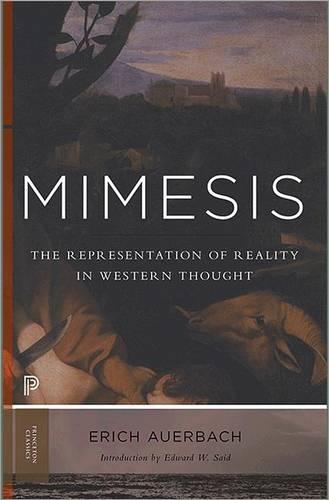
Mimesis: The Representation of Reality in Western Literature - New and Expanded Edition
(Paperback, New and Expanded Edition)
Publishing Details
Mimesis: The Representation of Reality in Western Literature - New and Expanded Edition
By (Author) Erich Auerbach
Translated by Willard R. Trask
By (author) Edward W. Said
Princeton University Press
Princeton University Press
2nd January 2014
New and Expanded Edition
United States
Classifications
General
Non Fiction
809.912
Physical Properties
Paperback
616
Width 140mm, Height 216mm
624g
Description
More than half a century after its translation into English, Erich Auerbach's Mimesis remains a masterpiece of literary criticism. A brilliant display of erudition, wit, and wisdom, his exploration of how great European writers from Homer to Virginia Woolf depicted reality has taught generations how to read Western literature. This new expanded edition includes a substantial essay in introduction by Edward Said as well as an essay, never before translated into English, in which Auerbach responds to his critics. A German Jew, Auerbach was forced out of his professorship at the University of Marburg in 1935. He left for Turkey, where he taught at the state university in Istanbul. There he wrote Mimesis, publishing it in German after the end of the war. Displaced as he was, Auerbach produced a work of great erudition that contains no footnotes, basing his arguments instead on searching, illuminating readings of key passages from his primary texts. His aim was to show how from antiquity to the twentieth century literature progressed toward ever more naturalistic and democratic forms of representation. This essentially optimistic view of European history now appears as a defensive--and impassioned--response to the inhumanity he saw in the Third Reich. Ranging over works in Greek, Latin, Spanish, French, Italian, German, and English, Auerbach used his remarkable skills in philology and comparative literature to refute any narrow form of nationalism or chauvinism, in his own day and ours. For many readers, both inside and outside the academy, Mimesis is among the finest works of literary criticism ever written. This Princeton Classics edition includes a substantial introduction by Edward Said as well as an essay in which Auerbach responds to his critics.
Reviews
"The compass and the richness of the book can hardly be exaggerated. This is true too of the originality of Mr. Auerbach's critical method which is at once encyclopedic and microscopic, combining the disciplines of philology, literary criticism, and history."--New York Times "One of the great works of literary scholarship... Auerbach's method ... is to fasten with fastidious sensitivity on some stray phrase or passage in order to unpack from it a wealth of historical insight. It is his combination of scholarly erudition and critical astuteness which is most remarkable."--Terry Eagleton, London Review of Books "One of the most important and readable books in literary criticism of the past 15 years ... The author, beginning with Homer and the Bible, traces the imitation of life in literature through the ages ...touching upon every major literary figure in western culture on the way."--Publishers Weekly "Written with the authority that comes from deep learning and full of information worth knowing. Princeton's 50th anniversary edition of Mimesis has an introduction by the late literary and cultural critic Edward Said that by itself is worth the price of the book. It's the only preface I know of that I wish were longer, serving as both an analysis of Auerbach and a ramework placing him in his scholarly and historical context... Princeton's reissue of Mimesis is both timely and symbolic."--Guy Davenport, Los Angeles Times Book Review "[Mimesis] offers not just an eminent reading of the Western canon, but a mighty lesson on how to write... I don't think a more significant or useful book of criticism has been written in the half-century since Mimesis was published. What's more, I can't imagine that anything like it will ever be written again... [In] producing such a rich, strong book on how to read, Auerbach composed a virtual manual on how to write, one I've referred back to again and again since the day, almost two decades ago, when I first happened upon it."--Jim Lewis, Slate Magazine
Author Bio
Erich Auerbach, before his death in 1957, was Sterling Professor of Romance Languages at Yale University.
